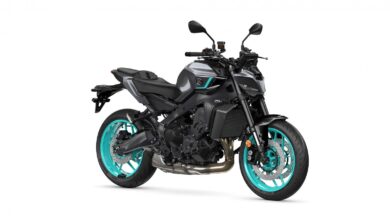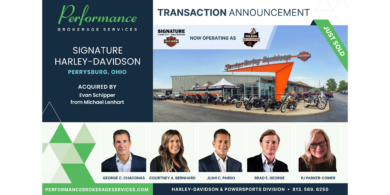Independent dealers may organize group
There is a move among some independent motorcycle dealers in the U.S. to create an industry trade group so that they can collectively deal with distributors who sell direct to consumers.
The effort is being headed by Doug Hart, owner and operater of the Custom Motorcycle Emporium in suburban St. Louis, Mo., for more than 25 years.
“We don’t want an adversarial relationship with distributors,” Hart told Powersports Business, “but we want them to conduct themselves in a way that’s good for everyone. Hopefully, (this step) is going to open distributors’ eyes so that they see that the way they are conducting themselves is short-sighted.
“This situation is escalating; it’s at critical mass and if it’s not addressed soon, it will be too late,” he said.
The problem: selling direct
The problem, as Hart sees it, is that some distributors are selling direct to consumers, often at less than dealer cost.
Also, he said, some distributors are selling direct to non-dealer companies, simply because they have a tax ID number.
“They don’t bother to check to see if they are selling to a bakery or a dry cleaner,” argues Hart. “These guys are buying parts for themselves and their buddies at dealer cost even though they aren’t dealers.”
How bad is the problem? According to one aftermarket company contacted by Powersports Business, the problem is severe. The marketing executive, who asked not to be identified, says at least one distributor is selling his product direct to consumers through an affiliated mail order company at about dealer cost. His product retails for about $350, but is sold to dealers through distributors for about $240 plus shipping. The mail order operation sells it for less than $250.
“We’re not talking about obsolete or overstocks,” says Hart. “We’re talking about hot, hard to get items.”
Hart said he doesn’t want to tell anyone how to run their business, but he would like distributors to do some things to help preserve the motorcycle dealer network:
1. Don’t sell mail order, “at ridiculous low prices that we can’t compete with;”
2. Don’t sell to non-dealers, and
3. Set up a minimum initial order.
Dealers respond to query
Hart said he mailed some 1,500 solicitation letters to independent motorcycle dealers in September, asking them if their business was being hurt by these activities and if they would be interested in joining the new not-for-profit group he is forming, called the Independent Motorcycle Shop Association (IMSA).
While Hart doesn’t have membership numbers, he said the “phone rang off the hook. For the next couple of weeks, I did nothing but answer the phone and e-mails.” He’s been in contact with “well over 1,000 companies,” he said.
Hart said during a mid-December telephone interview that he’s still compiling responses, but the problem facing independent dealers exists from coast to coast. “Sales are down 20% and 30% across the country,” he said, according to the responses, “and profits are down even more.”
According to his research, Hart says the average independent motorcycle shop generates annual revenues of approximately $500,000, with many exceeding $3 million.
The bigger operations have been the first responders, said Hart, because, with their large inventories, they are the most price sensitive. “And they’ve been around longer and have seen how rapidly things are changing,” he says.
While there will be several benefits to membership, including group purchasing plans, Hart says the primary focus “has to be on self preservation.” Annual dues in the IMSA are $100.
For details, contact Hart at 314/974-4672 or IMSA@imcshops.org.




